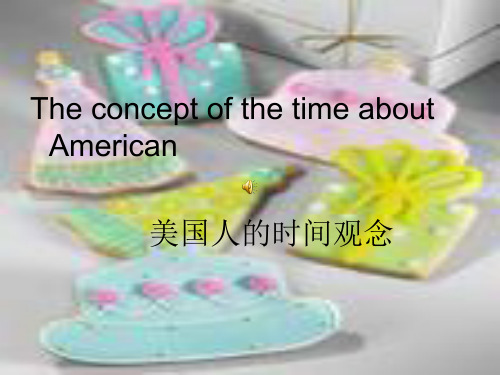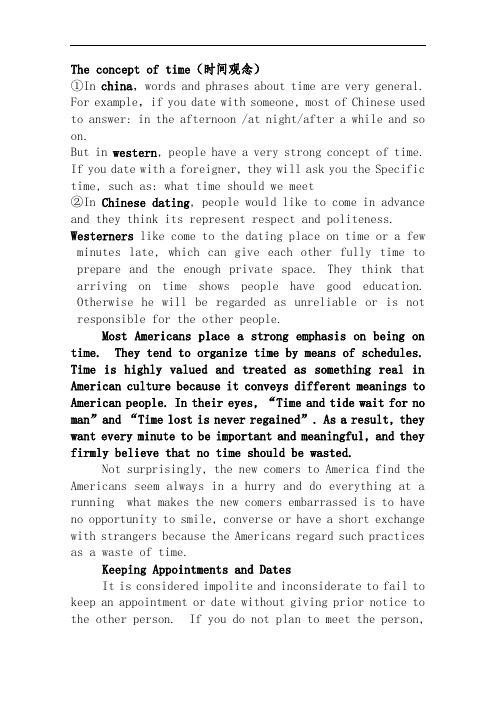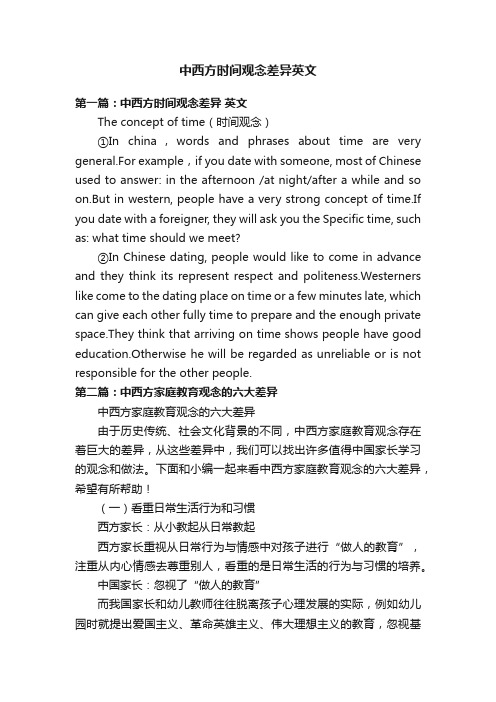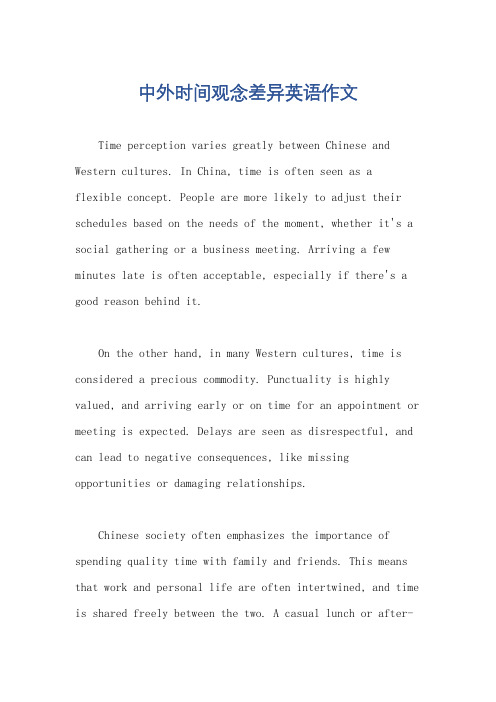中西方时间观念差异英文
中美时间观念的异同

5
To Americans, punctuality is a way of showing respect for other people's time. Being more than 10 minutes late to an appointment usually calls for an apology, and maybe an explanation. People who are running late often call ahead to let
美国人经常参加有关时间管理的研习会或阅读这方 面的书籍,他们似乎都希望能把自己的时间安排得更好。
9
No one can master time. Time-like money-slips all too easily through our fingers. And timelike the weather-is very hard to predict. Nevertheless, time is one of life's most precious gifts. And unwrapping it is half the fun.
没有人能够完全掌握时 间。时间就像金钱一样, 很容易就从我们的指间 溜走;时间也像天气一 样,是很难预测的。然 而,时间是生命中最宝 贵的礼物之一,而拆开 (这项难以掌握和预料 的)礼物本身就已经是 一种乐趣了。
10
Do you love life? Then do not waste time, for that is the stuff life is made of.
others know of the delay.
Different attitudes to time中西方时间观念比较

While Americans are used to Monochromic-Time
Americans prefer to do one things at a time
Causing the cultural differences
• Asians use time more freely and flexibly, preferring to hanging the wording of uncertainty on the lips, such as "immediately“, "sometimes", "most of the day," “in a while", which makes Westerners puzzle. • In Western society where time is almost a commodity, it is real and valuable, which can be traded, saved, wasted, lost, borrowed and measured. • "Time is money" seems to have become the credo of Western life.
M e e ting
In business meeting, 5 minutes late is OK in American. While in west culture, waiting is a waste of time. Americans have no tolerance to waiting too long. And the time spent in waiting may contain some massage. If some one want to be successful, he or she will not make others to wait. In China, if one is going to be late, no one will know how much time he or she will be late. In China, people are willing to wait. They believe that waiting can maintain good relationship. The time they spent on waiting may not contain much massage.
中西方时间观念差异-英文

The concept of time(时间观念)①In china,words and phrases about time are very general. For example,if you date with someone, most of Chinese used to answer: in the afternoon /at night/after a while and so on.But in western, people have a very strong concept of time. If you date with a foreigner, they will ask you the Specific time, such as: what time should we meet②In Chinese dating, people would like to come in advance and they think its represent respect and politeness. Westerners like come to the dating place on time or a few minutes late, which can give each other fully time to prepare and the enough private space. They think that arriving on time shows people have good education. Otherwise he will be regarded as unreliable or is not responsible for the other people.Most Americans place a strong emphasis on being on time. They tend to organize time by means of schedules. Time is highly valued and treated as something real in American culture because it conveys different meanings to American people. In the ir eyes, “Time and tide wait for no man”and “Time lost is never regained”. As a result, they want every minute to be important and meaningful, and they firmly believe that no time should be wasted.Not surprisingly, the new comers to America find the Americans seem always in a hurry and do everything at a running what makes the new comers embarrassed is to have no opportunity to smile, converse or have a short exchange with strangers because the Americans regard such practices as a waste of time.Keeping Appointments and DatesIt is considered impolite and inconsiderate to fail to keep an appointment or date without giving prior notice to the other person. If you do not plan to meet the person,then you should decline the invitation.。
中西方时间观念差异-英文教学提纲

中西方时间观念差异-英文精品文档Compared with America being slaves to nothing but the clock .Chinese care a little about time going by .The concept of time(时间观念)①In china,words and phrases about time are very general. For example,if you date with someone, most of Chinese used to answer: in the afternoon /at night/after a while and so on.But in western, people have a very strong concept of time. If you date with a foreigner, they will ask you the Specific time, such as: what time should we meet?②In Chinese dating, people would like to come in advance and they think its represent respect and politeness.Westerners like come to the dating place on time or a few minutes late, which can give each other fully time to prepare and the enough private space. They think that arriving on time shows people have good education. Otherwise he will be regarded as unreliable or is not responsible for the other people.Most Americans place a strong emphasis on being on time. They tend to organize time by means of schedules. Time is highly valued and treated as something real in American culture because it conveys different meanings to American people. In their eyes, “Time and tide wait for no man”and “Time lost is never regained”. As a result, they want every minute to be important and meaningful, and they firmly believe that no time should be wasted.Not surprisingly, the new comers to America find the Americans seem always in a hurry and do everything at a running pace.So what makes the new comers embarrassed is to have no opportunity to smile, converse or have a short exchange with strangers because the Americans regard such practices as a waste of time.Keeping Appointments and DatesIt is considered impolite and inconsiderate to fail to keep an appointment or date without giving prior notice to the other person. If you do not plan to meet the person, then you should decline the invitation.收集于网络,如有侵权请联系管理员删除。
中西方时间观念差异英文

中西方时间观念差异英文第一篇:中西方时间观念差异英文The concept of time(时间观念)①In china,words and phrases about time are very general.For example,if you date with someone, most of Chinese used to answer: in the afternoon /at night/after a while and so on.But in western, people have a very strong concept of time.If you date with a foreigner, they will ask you the Specific time, such as: what time should we meet?②In Chinese dating, people would like to come in advance and they think its represent respect and politeness.Westerners like come to the dating place on time or a few minutes late, which can give each other fully time to prepare and the enough private space.They think that arriving on time shows people have good education.Otherwise he will be regarded as unreliable or is not responsible for the other people.第二篇:中西方家庭教育观念的六大差异中西方家庭教育观念的六大差异由于历史传统、社会文化背景的不同,中西方家庭教育观念存在着巨大的差异,从这些差异中,我们可以找出许多值得中国家长学习的观念和做法。
中外时间观念差异英语作文

中外时间观念差异英语作文Time perception varies greatly between Chinese and Western cultures. In China, time is often seen as aflexible concept. People are more likely to adjust their schedules based on the needs of the moment, whether it's a social gathering or a business meeting. Arriving a few minutes late is often acceptable, especially if there's a good reason behind it.On the other hand, in many Western cultures, time is considered a precious commodity. Punctuality is highly valued, and arriving early or on time for an appointment or meeting is expected. Delays are seen as disrespectful, and can lead to negative consequences, like missing opportunities or damaging relationships.Chinese society often emphasizes the importance of spending quality time with family and friends. This means that work and personal life are often intertwined, and time is shared freely between the two. A casual lunch or after-work drink can easily last for hours, with no fixed schedule or agenda.Contrastingly, in Western cultures, work and personal time are often strictly separated. Once the workday ends, people tend to focus on their personal lives, leaving work-related matters behind. Appointments and meetings are scheduled with precision, and any deviation from the plan.。
中西方时间观念差异英语作文
中西方时间观念差异英语作文Differences in Time Consciousness between the East and the WestTime consciousness varies significantly between the East and the West. These differences can have an impact on various aspects of life, including work, social interactions, and personal schedules.In Western cultures, time is often seen as linear and quantitative. Punctuality is highly valued, and deadlines are strictly followed. Schedules are carefully planned, and meetings and appointments are usually scheduled in advance with specific start and end times. Being on time is considered a sign of respect and professionalism.In contrast, in some Eastern cultures, time is perceived more as a flexible and fluid concept. The focus is not solely on precise timekeeping but rather on achieving a certain level of completion or accomplishment. There may be a greater tolerance for delays and a more relaxed approach to schedules. Relationships and the context of the situation may take precedence over strict adherence to time.These differences can lead to misunderstandings and challenges in cross-cultural interactions. For example, in a Western business setting, being late for a meeting may be seen as unprofessional, while in some Eastern contexts, it might not hold the same significance.Understanding and respecting these time观念differences is essential in building effective relationships and successful communication across cultures. It is important to be aware of and adapt to the time expectations of different cultures when engaging in international collaborations or traveling abroad.This essay highlights the key differences in time consciousness between the East and the West, but it is important to note that these are generalizations and individual variations exist within each culture. By acknowledging and embracing these differences, we can enhance our intercultural competence and navigate diverse time-oriented situations more gracefully.。
中美文化之时间观念差异
24
Thank You!
3
Punctualty
4
Meeting
In business meeting, 5 minites late is OK in America..In China,if one is going to be late,no one will know how much time he or she will be late.
16
17
18
21
22
In China, the amount of time attributed to an activity is relatively flexible.For instance,Chinese do not hate the tendency of terminating an appointment before its natural conclusion,wheras America end the appointments at the appointed time and make way for the next one,according to schedules.Failure to do,they will be considered to be selfish and immoral.
12
Now in some big cities of China,such as Peking,Guangzhou,Shanghai,et c,people begin to use timetable in work, China is crossing the boundary from Polychronic-Time to Monochrome-Time.
中西方时间观念差异英语作文
中西方时间观念差异英语作文English Response:English Response:Time perception varies significantly between Western and Eastern cultures, reflecting diverse cultural values and societal norms. In Western societies, time is often viewed as a commodity to be managed efficiently, while in Eastern cultures, it's often perceived as more fluid, with a focus on harmony and relationships.One key difference is the concept of punctuality. In the West, being on time is highly valued and considered a sign of respect for others' time. For instance, if you have a meeting scheduled for 9 a.m., arriving at 9:05 a.m. could be seen as rude or unprofessional. In contrast, in some Eastern cultures like China, there may be more flexibility with time, and arriving a few minutes late might not be as frowned upon, especially in informal settings wherepersonal relationships matter more than strict adherence to schedules.Another aspect is the pace of life. Western societies often prioritize efficiency and productivity, leading to a fast-paced lifestyle where people are constantly busy and multitasking. Phrases like "time is money" emphasize the importance of using time wisely to achieve success. On the other hand, Eastern cultures may value a slower pace of life, allowing time for contemplation, leisure, and connection with others. In Japan, for example, the concept of "Ma" refers to the interval between events, emphasizing the beauty of pauses and silence in enhancing experiences.Furthermore, attitudes towards the future also differ. Western cultures tend to have a future-oriented mindset, where planning and goal-setting are highly emphasized. People are encouraged to think ahead, set long-term objectives, and work towards achieving them systematically. In contrast, some Eastern cultures, such as those influenced by Confucianism, may prioritize the present moment and place greater importance on maintaining harmonyin interpersonal relationships. This can be seen in phrases like "活在当下" (live in the moment) in Chinese culture, emphasizing the significance of cherishing the present instead of constantly worrying about the future.In conclusion, while both Western and Eastern cultures have their own unique perspectives on time, understanding and respecting these differences can facilitate effective communication and collaboration in today's globalized world.中文回答:时间观念在西方和东方文化中存在显著差异,反映了不同的文化价值观和社会规范。
中西时间文化差异英语作文
中西时间文化差异英语作文In Western culture, time is often seen as something to be managed and scheduled. People are expected to be punctual and respect deadlines.In contrast, in Chinese culture, time is viewed as more fluid and flexible. It is common for events to start late and for plans to change at the last minute.Westerners tend to value efficiency and productivity, often multitasking and trying to accomplish as much as possible in a short amount of time.On the other hand, Chinese people prioritize relationships and harmony, sometimes sacrificing efficiency in order to maintain social connections and avoid conflict.In Western culture, being busy is often seen as a status symbol, with people boasting about how little free time they have and how many tasks they need to juggle.In Chinese culture, on the other hand, leisure time and relaxation are highly valued, with people taking breaks throughout the day to socialize and enjoy life.Overall, the differences in time culture between East and West reflect broader cultural values and priorities, shaping how people approach their daily lives and relationships.。
- 1、下载文档前请自行甄别文档内容的完整性,平台不提供额外的编辑、内容补充、找答案等附加服务。
- 2、"仅部分预览"的文档,不可在线预览部分如存在完整性等问题,可反馈申请退款(可完整预览的文档不适用该条件!)。
- 3、如文档侵犯您的权益,请联系客服反馈,我们会尽快为您处理(人工客服工作时间:9:00-18:30)。
中西方时间观念差异英
文
Document serial number【UU89WT-UU98YT-UU8CB-UUUT-UUT108】
Compared with America being slaves to nothing but the
clock .Chinese care a little about time going by .
The concept of time(时间观念)
①In china,words and phrases about time are very general. For example,if you date with someone, most of Chinese used to answer: in the afternoon /at night/after a while and so on.
But in western, people have a very strong concept of time. If you date with a foreigner, they will ask you the Specific time, such as: what time should we meet
②In Chinese dating, people would like to come in advance and
they think its represent respect and politeness.
Westerners like come to the dating place on time or a few minutes late, which can give each other fully time to prepare and the enough private space. They think that arriving on time shows people have good education. Otherwise he will be regarded as unreliable or is not responsible for the other people.
Most Americans place a strong emphasis on being on
time.?They tend to organize time by means of schedules. Time is highly valued and treated as something real in American culture because it conveys different meanings to American people. In
their eyes, “Time and tide wait for no man”and “Time lost is never regained”. As a result, they want every minute to be important and meaningful, and they firmly believe that no time should be wasted.
Not surprisingly, the new comers to America find the Americans seem always in a hurry and do everything at a running what makes the new comers embarrassed is to have no opportunity
to smile, converse or have a short exchange with strangers because the Americans regard such practices as a waste of time.
Keeping Appointments and Dates
It is considered impolite and inconsiderate to fail to keep an appointment or date without giving prior notice to the other person.?If you do not plan to meet the person, then you should decline the invitation.。
